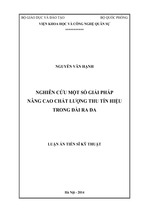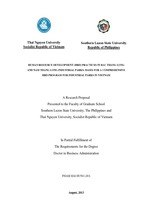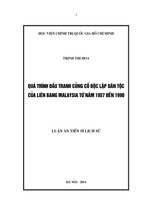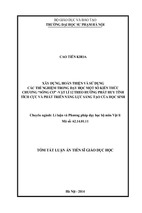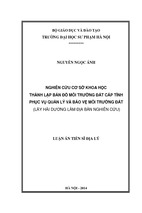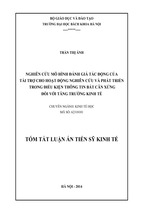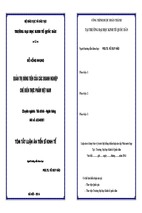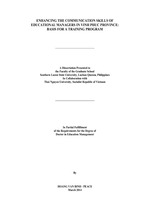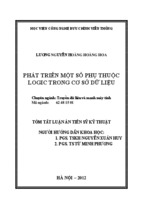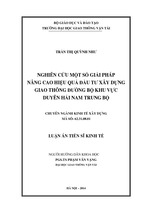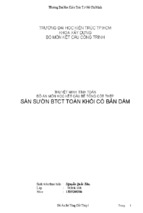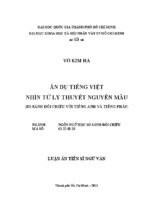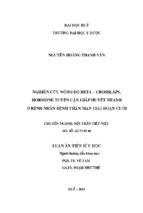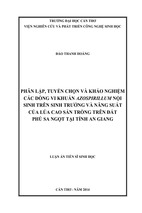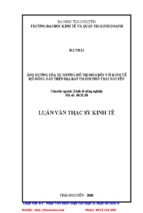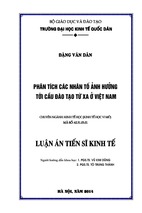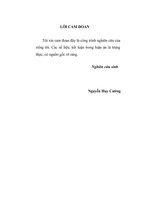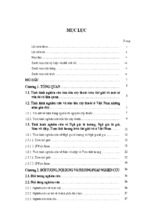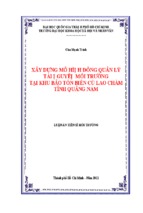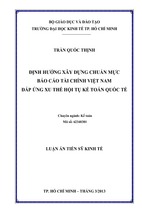CORRELATES OF TEACHERS’ PEDAGOGICAL COMPETENCE
IN THE COLLEGES OF ECONOMICS
AT THAI NGUYEN PROVINCE
A Dissertation Presented to
the Faculty of the Graduate School
Southern Luzon State University, Lucban, Quezon, Philippines
in Collaboration with
Thai Nguyen University, Socialist Republic of Viet Nam
In Partial Fulfillment of the
Requirements for the Degree
Doctor of Philosophy
in Educational Management
By
NGUYEN THI MINH THU (Autumn)
April 2014
ii
APPROVAL SHEET
The Dissertation of
NGUYEN THI MINH THU (Autumn)
entitled
CORRELATES OF TEACHERS’ PEDAGOGICAL COMPETENCE
IN THE COLLEGES OF ECONOMICS
AT THAI NGUYEN PROVINCE
Submitted in Partial Fulfillment of the
Requirements for the Degree
Doctor of Philosophy in Educational Management
In the Graduate School
Southern Luzon State University, Republic of the Philippines
in collaboration with
Thai Nguyen University, Socialist Republic of Vietnam
has been approved by the Committee
______________________
Member
______________________
Member
______________________
Member
______________________
Member
_____________________
Chairman
TERESITA V. DE LA CRUZ, Ed.D.
Adviser
SUSANA A. SALVACION, Ph.D.
Dean, Graduate School
Accepted in partial fulfillment of the requirements for the degree
Doctor of Philosophy in Educational Management
WALBERTO MACARANAN, Ed. D
Vice President, Academic Affairs
_____________________
Date
iii
ACKNOWLEDGEMENT
The researcher wishes to convey her gratitude to the following persons
who wholeheartedly devoted and helped make this piece of work a reality:
DR. TERESITA V. DE LA CRUZ, her adviser for the guidance, supervision,
suggestions and precious time in enthusiastically reading and checking
the manuscript, providing the researcher useful materials;
DR. CECILIA N. GASCON, President of the Southern Luzon State University
in the Republic of the Philippines, for her incomparable contribution
and support to the development of Doctor of Philosophy in Educational
Management program in Thai Nguyen University;
DR. NGUYEN VAN BINH, director of the International Training Center, Thai
Nguyen University of Socialist Republic of Vietnam, for his enormous
pursuit to provide Vietnamese people an opportunity to grow through
education;
The DIRECTORS and TEACHERS of College o Economic sand Engineering,
Thai Nguyen Industrial College, Vietnam-Germany Industrial College,
Thai Nguyen College of Economics and Finance, and College of Trade
and Tourism for allowing the conduct of study and active involvement
and participation; and
His FAMILY and FRIENDS, for the love and support in one way or another;
and to all who have contributed to make this study a success.
NTMT
iv
DEDICATION
This research is whole-heartedly dedicated to my family and to all my
relatives, my colleagues and friends, and to all classmates, all directors and
teachers of the respondent credit-based schools for giving the researcher the
non-stop guidance and sources of everything.
NTMT
v
TABLE OF CONTENTS
Page
TITLE PAGE………………………………………………………….………….. i
APPROVAL SHEET……………………………………………………..………. ii
ACKNOWLEDGMENT……………………………………..………………...…. iii
DEDICATION………………………………………………..………………...…. iv
TABLE OF CONTENTS……………………………………..………………...... v
LIST OF TABLES………………………………………………………………... vi
FIGURE…………………………………………………………………………… vii
ABSTRACT…………………………………………………………………..…… ix
CHAPTER
I. INTRODUCTION…………………….………………………………....
Background of the Study……………………..………………………..
Objectives of the Study….….………………………….………………
Significance of the Study …………………...…………..…………….
Scope and Limitation…………………………………...…..………….
Definitions of Terms………………………………….…….…...……...
1
2
3
5
5
6
II. REVIEW OF RELATED LITERATURE AND STUDIES.……..……. 9
Conceptual Framework …….…………………………………………. 29
Research Paradigm…………………………………….……………… 31
III. METHODOLOGY ………………………………………………………
Locale of the study……………………………………………………..
Research Design.……………………….……………………………...
Population and Sampling………………………………………..….....
Research Instrumentation………………………….………………….
Data Gathering Procedures……………………………………….......
Statistical Treatment…………………………….…………………......
32
32
32
33
34
34
35
IV. RESULTS AND DISCUSSION…………………………………….…
37
V. SUMMARY, CONCLUSIONS AND RECOMMENDATIONS…….....
Summary …………………………….…………………………….........
Findings………………………………………………………………….
Conclusions…………………………………………………….…….…
Recommendations……………………………………………..……….
63
64
65
67
68
BIBLIOGRAPHY….…….………………………………………………………
78
APPENDICES……………………………………………………………..……
A Communication…………………………………………………………
B Instrument …………………………………………………..………….
B Computations….....…………………………………………………….
80
81
88
93
CURRICULUM VITAE………..………………………………………………..
94
vi
LIST OF TABLES
Table
Page
1
Distribution of the Respondents by College ………………….….
33
1.1
Distribution of the Respondents in terms of Gender…………….
37
1.2
Distribution of the Respondents in terms of Civil Status ……….
38
1.3
Distribution of the Respondents in terms of Age …….………….
39
1.4
Distribution of the Respondents as to Length of Service……….
40
1.5
Distribution of the Respondents as to Baccalaureate Degree.…
41
1.6
Distribution of the Respondents as to Seminars Attended …….
42
1.7
Distribution of the Respondents as to Teacher’s Performance
Rating………………………………………………………………….
43
Frequency and Mean Distribution of Teachers in Pedagogical
Competence as to Preparation for Teaching……………………..
44
Frequency and Mean Distribution of Teachers in Pedagogical
Competence as to Classroom Management……………………....
46
Frequency and Mean Distribution of Teachers in Pedagogical
Competence as to Lesson Presentation …………………………..
47
Frequency and Mean Distribution of the Teachers in
Pedagogical Competence as to Assessment...............................
49
Significant Relationship between Pedagogical Competence
and Teachers Profile (Age)…………………………………………
51
Significant Relationship between Pedagogical Competence
and Teachers Profile (Gender)……………………………………
52
Significant Relationship between Pedagogical Competence
and Teachers Profile (Civil Status)……………………………….
53
Significant Relationship between Pedagogical Competence
and Teachers Profile (Educational Attainment)………………….
54
Significant Relationship between Pedagogical Competence
and Teachers Profile (Length of Service)………………………..
55
Significant Relationship between Pedagogical Competence
and Teachers Profile (Seminars/Trainings Attended) …………
56
2.1
2.2
2.3
2.4
3.1
3.2
3.3
3.4
3.5
3.6
vii
3.7
4.1
4.2
4.3
Significant Relationship between Pedagogical Competences
and Teachers Profile (Teachers’ Performance Rating)…………
57
Acceptability of the Proposed Faculty Development Program
as to Content…………………………………………………………
60
Acceptability of the Proposed Faculty Development Program
as to Strategies ……………………………………………………..
61
Acceptability of the Proposed Faculty Development Program
as to Economy ………………………………………………………
62
viii
FIGURE
Figure
1
Page
Research Paradigm ………………………………………….……. 31
ix
ABSTRACT
Title of Research
:CORRELATES OF TEACHERS’ PEDAGOGICAL
COMPETENCE IN COLLEGES OF ECONOMICS
AT THAI NGUYEN PROVINCE
Researcher
:NGUYEN THI MINH THU (Autumn)
Degree Conferred
Name/ Address
of Institution
ADVISER
YEAR WRITTEN
:Doctor of Philosophy in Educational Management
: Southern Luzon State University
Lucban, Quezon
:DR. TERESITA V. DE LA CRUZ
:November 2013
The goal of this study was to find out the correlates of pedagogical
competency of the teachers-respondents in Colleges of Economics at Thai
Nguyen Province. It utilized survey questionnaires as the main data gathering
instrument. This study used the descriptive correlational method of the study
to determine the significant relationship between respondents’ profile and their
pedagogical competency. The survey on teachers’ demographic profile was
presented through frequency and percentage; pedagogical competency of the
respondents using weighted mean; and the relationships of the two variables
through Pearson r. The results of the data analyzed were used as basis for
proposing the faculty development program. It was then found out that most of
the teachers are females, married, relatively young, novice in the service, has
baccalaureate degree and a considerable number of trainings and seminars,
and are average in terms of performance rating. Teachers are pedagogically
competent in terms of preparation for teaching (2.88), classroom management
(2.70), lesson presentation (2.83), and assessment of students (2.81). Age,
civil status, length of service and performance rating mostly influence the
teacher’s pedagogical competence while educational attainment determine to
x
a little extent the teachers’ classroom management skill. The proposed faculty
development program is highly acceptable as to contents (3.33), strategies
(3.36), and economy (3.26), and therefore is ready for initial implementation.
However, it was recommended that the faculty development program might
be enhanced to further suit the needs of the teachers and may be adopted by
other colleges with the same pedagogical needs.
Chapter I
INTRODUCTION
Pedagogical competence has been regarded either as an ensemble of
potential behavior/ capacity allowing for efficient manifestation of an activity,
or as the minimum professional standard, often specified by law, in which the
professionals should reach. Thus, the first statement takes into consideration
the resources used in the educational process starting from and based on
developing the competence. This approach regards pedagogical competence
as “the ability of an individual to use coordinated, synergistic combination of
the tangible resources (e.g. instruction materials such as books, articles, and
cases and technology like software and hardware) and intangible resources
(e.g. knowledge, skills, experience, attitudes) to achieve the efficiency and
effectiveness in pedagogy” (Madhavaram, 2010).
The pedagogical competence in general consists of the preparation for
teaching, lesson presentation, classroom management, and an assessment of
students’ performance. Shrestha (2008) asserted that the competent teacher
needs not only content mastery but also pedagogical competency. Content
mastery provides knowledge about what to present in the classroom whereas
the pedagogical competency provides the knowledge as well as skills in how
to present the content. Nguyen Thị My Loc (2003) cited that pedagogy is the
art of teaching bringing effectiveness in teaching-learning. Effective pedagogy
promotes achievement of students and builds up the confidence of teachers in
teaching. It contributes in bringing quality of learning and teaching in class).
The teachers need to be good at professional knowledge which means that
teachers must have a deep knowledge of their subjects, always update and
2
add new knowledge o refine and improve their knowledge. According to
Srutirupa (2012), teachers must develop as well as enhance their pedagogical
competence to determine the quality of their teaching and professional skills.
Pedagogical competence is important in determining the efficiency of creative
labor process of teaching. Enhancing the teachers’ pedagogical competence
is considered an innovative solution to improve the quality of human resource
training (Ryegard,Orisson,Apelgren,&Eriksson, 2010).
Pedagogical competence is described by Giertz (2003) as the ability
and the will to regularly apply the attitude, knowledge and skills that promote
the learning of the students. It shall take place in accordance with the goals
that are being aimed at and the existing framework and presupposes
continuous development of the teacher’s own competence and course design.
Background of the Study
Most of the teachers in the Colleges of Economics graduated from the
University of Economics. In Vietnam, the universities and colleges do not train
pedagogical competence for students (except for pedagogical universities and
colleges). Before they become teachers, they participate in the standardized
pedagogical competence course, but time is not enough for them to enhance
their pedagogical competence.
Thus, teachers have a number of limitations in terms of developing their
pedagogical competence. Some teachers are not that interested in innovating
their teaching methods and presentation method so they still follow ‘teachers
present-students-write-notes scheme. Teachers sometimes only take charge
of the teaching knowledge to students without instructing students’ methods of
3
self-learning and self-study. Their ability to prepare their daily lesson plans still
needs polishing for it to promote students’ creativity and activeness. Added to
these are the difficulties in the art of questioning, inability to communicate well
with the students, handling disciplinary problems and the likes. The teachers’
application of computer and information technology still needs enhancement.
As observed by the researcher, teachers seldom incorporate the educational
technology in classroom instruction making the class interaction boring.
It is also a challenge among teachers when they evaluate the classroom
activities and individual performance of the students. They are likely to focus
more in the traditional assessment and not so much on exploring individual
capabilities of their students in engaging in other activities that do not entail a
paper-and-pencil test. The diversity of the teaching methods employed are not
consistently evident in every classroom because what prevails is more of the
question-and-answer method.
Aware of the aforementioned dilemmas, the researcher was prompted
to determine the correlates of the teachers’ pedagogical competence in the
Colleges of Economics at Thai Nguyen Province with an end view of
proposing faculty development program to improve pedagogical competence
of teachers and meet the requirements of the national education in general
and higher education in particular.
Objectives of the Study
This study aimed to find out the correlates of pedagogical competence
in Colleges of Economics as basis for proposing faculty development program
at Thai Nguyen Province for the school year 2013-2014.
4
Specifically, it sought answer to the following objectives:
1. Determine the profile of the teachers in terms of;
1.1 Gender,
1.2 Civil status,
1.3 Age,
1.4 Length of service,
1.5 Educational attainment,
1.6 Seminars/ trainings attended, and
1.7 Teachers’ performance rating.
2. Find out the pedagogical competence of teachers in terms of:
2.1 Preparation for teaching,
2.2 Classroom management,
2.3 Lesson presentation, and
2.4 Assessment of students.
3. Ascertain if there is a significant relationship between the teachers’ profile
and their pedagogical competence.
4. Develop a faculty development program to foster pedagogical competence
of teachers.
5. Find out the level of acceptability of the faculty development program as to:
5.1 Contents,
5.2 Strategies, and
5.3 Economy.
Significance of the Study
This study would be beneficial to the teachers, students, administrators
and future researchers in the following respect:
5
Teachers. The outcome of the study is of great help to the teachers in
the Colleges of Economics where most teachers have insufficient trainings in
advancing their pedagogical skills. Faculty development program would serve
to enhance their pedagogical competencies in the teaching-learning process.
Students. They would be benefited in this research since they are the
main concerns of educators. The teachers with high pedagogical competence
could give more direct impact on the quality of teaching they deliver among
students thereby making the classroom environment inviting and interesting
for them to focus more in the classroom activities.
Administrators. It is hoped that the study may contribute in giving a
new dimension in administration and supervision of Colleges of Economics.
The study would provide administrators insights on how they can manage the
pedagogical competence of teachers effectively and successfully.
Future Researchers. This research could provide references for future
proponents who wish to venture a study similar to the nature of this ongoing
research. Moreover, they could use the information and results of the study to
substantiate their parallel and future researches.
Scope and Limitations
This study focused on the pedagogical competence of teachers in the
Colleges of Economics at the Thai Nguyen Province for the school year 20132014. It was limited to 136 teachers who were held respondents in this study.
Survey of the teachers’ demographic profile and measurement of their
pedagogical competence were limited to the use of checklist questionnaires.
The teachers’ personal profiles such as gender, civil status, age, length of
6
service, educational attainment and teaching performance rating were used to
correlate with pedagogical competence on areas of preparation of teaching,
classroom management, lesson presentation, and assessment of students.
The time frame of this study was from August 2013 to February 2014.
Definition of Terms
For clarity and better understanding of the study, the following terms
are defined both conceptually and operationally.
Age is a period of human life, measured by years from birth (Error!
Hyperlink reference not valid.). In the context of this study, it refers
to one of the demographic profile correlates to pedagogical
competence.
Assessment of Students is operationally defined as teacher’s pedagogical
competency in evaluating students’ classroom performances and ability
to utilize different forms of assessment techniques.
Civil status is the term used mostly by government organizations to show a
person’s status as a citizen (Retrieved from Error! Hyperlink
reference not valid.). In this research, it is one of the correlates to
teachers’ pedagogical competence.
Classroom management is defined as the actions teachers take to create an
environment that supports and facilitates both the academic and socialemotional learning (Evertson & Weinstein, 2006). It refers to one of the
measures of pedagogical competence.
Educational attainment refers to the level of education completed in terms of
highest degree or the highest level of schooling completed (US Census
7
Bureau Glossary, 2006).In this research, it is one of the correlates to
pedagogical competence.
Faculty Development Program is a broad term describing any of the various
activities carried out by faculty members for personal and professional
enrichment (Marywood University Faculty Development, 2012).In this
study, it refers to a program of activities for teachers to improve their
pedagogical competence especially in their weak areas.
Gender refers to the respondent’s identity as to male or female. In this study,
it is one of the correlates to pedagogical competence.
Length of Service is operationally defined as the actual number of years the
teacher has served in Colleges of Economics in Thai Nguyen Province.
Lesson Presentation is defined in this study as the pedagogical competency
of the teachers which includes their ability to employ different teaching
styles and methods to carry out the lessons.
Pedagogical competence refers to the ability of an individual teacher to use
coordinated, synergistic combination of tangible resources (instruction
materials such as books, articles, and cases and technology such as
software and hardware and intangible resources such as knowledge,
skills, experience to attain the pedagogical efficiency and effectiveness
(Madhavaram, 2010). In this study, it encompasses the preparation for
teaching, classroom management, presentation of lesson, and student
performance assessment.
Preparation for teaching is used in this study as one of the measures of the
pedagogical competence of the respondents. It includes teacher plans
8
for teaching, goals/ objectives, instructional materials, strategy/method,
and assessment to be used.
Seminars/ Trainings Attended refer to the conferences, lecture courses, or
other meetings for discussion/training related to teacher’s professional
advancement. It is one of the correlates to pedagogical competence.
Teachers’ Performance Rating refers to the rating given by the immediate
head at the end of school year/semester for the teaching performance
based from the college/school sets of indicators.
9
Chapter II
REVIEW OF LITERATURE AND STUDIES
This chapter presents the relevant readings and related literature which
bear significance and similarities in this study. This also includes conceptual
framework and research paradigm that guide the conduct of the study.
Pedagogical Competence
Pedagogical competence is “the ability of individual to use coordinated,
synergistic combination of tangible resources (e.g. instruction materials such
as books, articles, and cases and technology such as software and hardware)
and intangible resources (e.g. knowledge, skills, and experience) to achieve
efficiency and/ or effectiveness in pedagogy” (Madhavaram & Laverie, 2010).
Ryegard, Orisson, Apelgren and Eriksson (2010) described pedagogical
competence as the ability and will to regularly apply the attitude, knowledge
and skills that promote the learning of the students. This shall take place in
accordance with the goals that are being aimed at and the existing framework
and presupposes continuous development of the teacher’s own competence
and course design.
The concept of pedagogical competence also tends to be used with the
meaning of the minimum professional standard, often specified by the law,
which should raise a person in fulfilling particular role of teaching profession
(Gliga, 2002). According to Diaconuand Jinga (2004), the level at which the
pedagogical competence is analyzed special attention is given to the results
10
obtained in any educational process developed through the perspective of
competence thus stressing on the performance to which various methodical
algorithms for achieving teaching tasks are selected, combined and put into
effect depending on changes of situational context in which the educational
activities are realized with students.
Giertz (2003) stated that pedagogical competence can be described
as the ability and twill to regularly apply attitude, knowledge and skills that
promote the learning of teacher’s students. This shall take place according to
goals that are being aimed at and existing framework and presupposes
continuous development of teacher’s own competence and course design.”
Pedagogical competence implies that the teacher from definite goals
and frameworks, through continuous development of teaching and personal
professional development, supports and facilitates the learning of students in
the best way. This pedagogical competence also reflects the teacher’s
competence regarding collaboration, comprehensive view and contribution
to the development of pedagogy for higher education” (Ryegård, 2008).
Knowledge and method are two components to create pedagogical
competence. Knowledge is not only the professional knowledge(narrow) but
also pedagogical knowledge such as psychology, education, sociology, logic,
art and the personal experience. However, having only the knowledge is not
enough, if teachers want to have pedagogical competence, they should have
educational methods, good teaching methods. Good method is a method in
accordance with the object and having high efficiency.
Ryegard et al. (2010) found out that three things are required in order
to be able to assess a teacher’s pedagogical competence: A definition of the
- Xem thêm -


